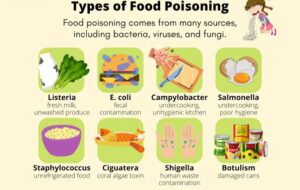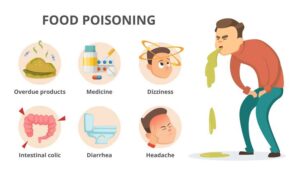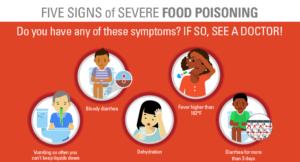FOOD POISONING
Food poisoning which is also known as food borne illness occur as a result of consuming food or drinks contaminated with harmful bacteria(salmonella, E.coli), viruses(like Norovirus, Rotavirus), parasites, or toxins(such as botulinum, Staphylococcus). These contaminants can make one fall sick by causing symptoms like nausea, vomiting, stomach cramps, diarrhea, blood in stool, fatigue, fever etc. It is important to practice good food hygiene, like washing hands,washing food items, proper storage of food, cooking food thoroughly and cleaning cooking environment in order to prevent food poisoning.

There are various factors that contribute to the causes of food poisoning and they include;
1. Consuming undercooked or raw meat, poultry, or eggs
2. Unhygienic handling of food or food preparation
3. Contaminated water or ice
4. Expired or spoiled food
5. Food from unsafe sources (e.g., street vendors, unlicensed restaurants) and many more.
In order to prevent food poisoning, it’s essential to follow some key practices like washing your hands thoroughly before and during food preparation or handling, proper cooking of meat and poultry to the right temperature, storing food properly in the fridge, avoiding cross-contamination between raw and cooked foods, and consuming perishable foods promptly. Also it is important to choose safe sources of food and keep your cooking environment clean always.

Nutrition plays an important role when dealing with food poisoning. It’s crucial to focus on rehydrating and replenishing lost nutrients due to vomiting and diarrhea by drinking clear fluids like water, broth, or electrolyte drinks such as ORS or liquid containing zinc to stay hydrated. Avoid spicy or fatty foods, high-fiber foods, caffeine and carbonated drinks. Ginger also has a natural anti-inflammatory properties that may help alleviate nausea and stomach discomfort, so it’s advisable to take drinks like ginger tea or ginger candies.

Once the symptoms has improve, gradually introduce a balanced diet that includes a variety of whole foods and if the symptoms persist, it’s advisable to see an health-care provider.
Read more on: Eating Disorder and Nutritional Management�





Leave a Reply